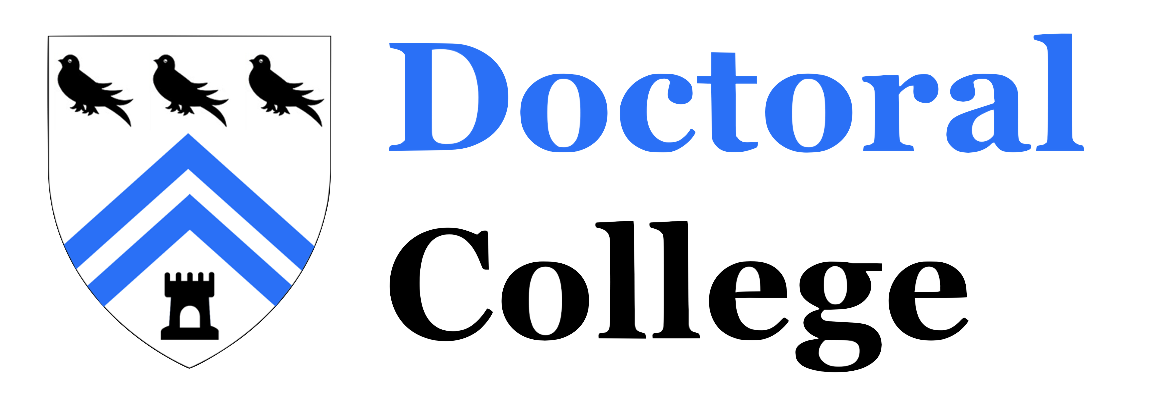Senate – Terms of Reference
The Senate Terms of Reference are:
The Senate shall be responsible for the academic work of Doctoral College, in particular for the strategic development of academic activities and for the approval of policies to promote and ensure the qualities and standards of the academic work of the College, including teaching, research and knowledge exchange.
The Senate shall report to the Board of Governors on any matters referred to the Senate by the Board, and may discuss, declare an opinion and make recommendations to the Board on any matter of interest to the College.
The Senate shall assure the Board of the academic standards and quality of education leading to Doctoral College awards and qualifications, and other educational provision.
The Senate has authority to make such Regulations, as are necessary to fulfil the powers, duties and functions of the Senate as set out in the Terms of Reference.
Powers, Duties and Functions:
The Senate is the principal body responsible for the strategic development of the academic activities of Doctoral College, including teaching, research, and knowledge exchange, and the regulation, governance, standards and quality assurance of the academic work of the College.
Its responsibilities include:
To determine and review regularly the policies and Regulations governing:
- the College’s programmes leading to awards and qualifications, and other educational provision;
- the conduct of research and also knowledge exchange;
- the ethical conduct of academic activities;
- the appointment, probation and promotion of academic staff;
- academic roles; and
- the welfare and discipline of students.
To ensure that the College is compliant with all relevant external regulatory requirements insofar as they concern its responsibilities under these Terms of Reference.
To develop the academic strategies of the College and to scrutinise the academic (teaching, research, and knowledge exchange) strategic plans of any part of the College and make recommendations to the Board of Governors for approval.
To raise issues of major and strategic academic importance and risk to the College.
To approve policies to support and foster academic freedom in relation to the academic activity of the College and to report to the Board on matters of concern in relation to the provision of academic freedom.
To exercise all such powers, duties and functions as are or may be conferred on the Senate by the Terms of Reference.
To make representation to the Board on all proposed changes of the Terms of Reference of the Senate and on any academic matter.
The Senate has authority to make such Regulations as are necessary to fulfil its powers, duties and functions.
The Senate may delegate any of its functions, duties and powers (other than its power to make Regulations and provide effective oversight of the College’s Quality Assurance processes) to committees appointed by it or to its officers as it sees fit, and such committees and individuals may further delegate unless the Senate has provided to the contrary.
Powers:
The specific powers of Senate include:
To institute, and regulate schemes of study and examinations leading to, Degrees, Diplomas, Certificates and other academic awards of the College, and grant such to persons who have satisfied the conditions of the award thereof as prescribed in the academic documents for the award.
To institute and then, after consideration jointly by the Board of Governors and the Senate, grant Honorary Degrees.
To recommend to the Board the names of persons, who in the opinion of the Senate, should be deprived of any Degrees, distinctions or titles, Diplomas or Certificates, conferred on or granted to them by the College, and from whom all privileges connected therewith should be withdrawn.
To oversee, and to determine from time to time by means of Regulation, policies and procedures for student health, wellbeing and fitness to study, conduct and disciplinary matters, fitness to practise and professional suitability, academic misconduct, academic appeals and students’ complaints, and delegate associated operational responsibilities to relevant academic sections and professional services departments of the College.
To suspend, discipline, exclude or expel any student in accordance with the provisions of any Regulation from time to time made.
To confer the titles of Emeritus Professor, Honorary Professor, Reader or Lecturer, or other such titles.
To institute, subject to any conditions acceptable to the Senate, Fellowships, Studentships, Scholarships, Exhibitions, Bursaries, Prizes and other such grants, for the encouragement of study and research; and to determine the times, modes and conditions of competition and to examine for and award the same, or to delegate these powers.
To institute an academic (including teaching and research) ethics framework to maintain schemes to ensure ethical conduct and academic integrity within the University meet the University’s standards and external standards where required.
To formulate, modify or revise schemes for the organisation of teaching and research via academic sections of the College, and review from time to time the working of such schemes. The Senate may also make recommendations to the Board to institute, combine or discontinue any academic (teaching or research) sections of the College.
To review, amend, refer back or to disallow any act of any academic section of the College.
To establish Committees and Joint Committees of the Senate as required.
To prescribe the academic dress to be worn by the Officers and Members of the College, and the occasions on which it shall be worn; and to determine the form and conduct of all academic ceremonies.
To appoint and elect members of the Senate to be elected members of the Board.
To co-opt members of the Senate as provided for any academic role on College Boards, committees or sub-committees.
Except as otherwise provided, to appoint representatives of the College to other bodies.
To elect members to the Joint Committees regarding appointment of the Dean and Chair of the Board of Governors.
Jointly with the Board of Governors, to agree the procedures for the appointment and renewal of the Dean, Deputy Dean and other senior academic roles with an academic remit.
Duties and Functions:
The specific duties and functions of the Senate include to regulate all academic matters affecting the academic policy of Doctoral College, considering and approving recommendations from the Senate Committees regarding:
The introduction and withdrawal of new modules/units or programmes/courses of study leading to the award of a Doctoral College Certificate, Diploma or Degree of the College.
The entrance and continuation requirements for programmes/courses of study and research within the College.
The conduct of assessments and examinations, including issues relating to mitigating circumstances and re-assessment opportunities, and rescinding any award that may have been made to a person who subsequently qualifies for a higher award within the same scheme of study (where a scheme of study provides for more than one academic award).
The appointment of internal and external examiners and to determine their conditions of appointment and service.
The determination of the conditions under which and the extent, if any, to which periods and programmes/courses of study and examinations passed at other universities, places of learning and other institutions, may be regarded as equivalent to periods and programmes/courses of study, assessment and examinations in the College.
The recommendation or reporting to the Board on any financial implications of the academic policy of the College, accounting for the views of the academic areas of the College concerned.
The training and development of staff charged with:
- teaching, assessing course work and examining students, including graduate teaching assistants and research fellows;
- postgraduate research student supervision;
- the technical or administrative support of teaching
- personal tutoring
- welfare support for students; and
- investigating complaints, appeals and student misconduct and chairing or serving as a member of the associated hearing panels.
The arrangements for the tuition, supervision, assessment, welfare and discipline of students studying at another institution as part of their College programme/course of study.
The establishment or termination of collaborative academic partnerships (teaching or research) with other bodies in the UK or abroad.
The scheduling and reporting of periodic reviews of taught programmes (undergraduate and postgraduate) and postgraduate research programmes/course and the appointment of the chairs and members of the review panels.
The Senate shall scrutinise academic performance against student-related (undergraduate, postgraduate taught and postgraduate research) measures of success relating, for example, to the following matters and investigate any arising risk and matters of concern: student recruitment, retention and completion rates; graduate outcomes; equality and diversity in the student populations, including issues relating to widening access; uptake of bursaries and scholarships; student complaints, appeals and student misconduct; and student survey data.
The Senate shall scrutinise academic performance against academic staff-related measures of success relating, for example, to the following matters and investigate any arising risk and matters of concern: teaching, research and knowledge exchange performance; equality and diversity in the academic staff population; recruitment, retention and career progression of academic staff; academic staff training, misconduct and appeals; academic staff awards and recognition; and staff survey data.




